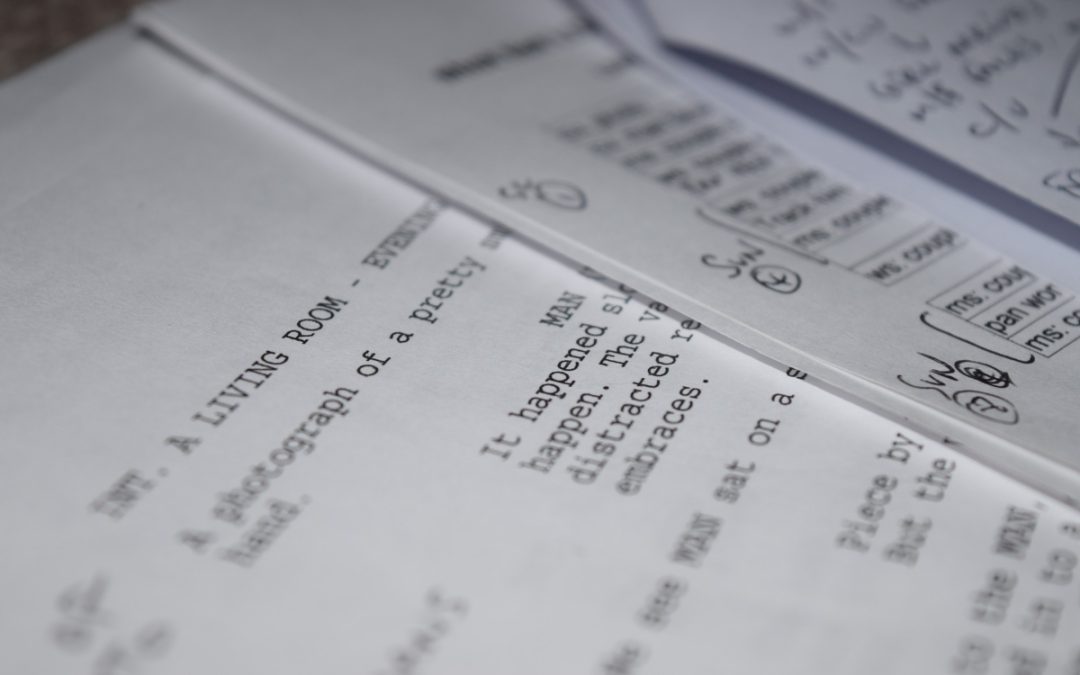
by Jenna | Oct 10, 2020 | Final Draft Articles
Despite everything that’s going on I’m thrilled to have finished a major revision of the first act of my script. While there’s more to go, getting the first act sorted for the new vision for the storyline has been a big undertaking. This article goes into my methodology for tackling a major script revision, much of which translates quite handily for novel revision too.

“The beautiful part of writing is that you don’t have to get it right the first time,
unlike, say, a brain surgeon.”
– Robert Cromier

If you’re staring down a major script rewrite it’s easy to feel overwhelmed, particularly when dealing with large-scale structural or character changes—or both! Even though we know “writing is rewriting,” it can be daunting to face a big overhaul, especially if this isn’t the first major revision you’ve made to this script.
One of the biggest obstacles writers face with a major rewrite is mentally releasing the old version and fully embracing the new one. It can feel like two parallel universes jostling to occupy the same space. Without Cisco Ramon from The Flash to breach us between alternate realities, we have to find our own way to span the chasm between the two. I call this bridging the rewrite gap.
If you’re finding yourself having trouble letting go of the old story (Hint: you’re constantly saying, “Well, in the current draft, x happens…”) these six steps will help you make a smoother transition from old to new, as well as expedite your rewrite along the way.
Read the article on the Final Draft blog here:
6 Steps to Tackling a Major Script Revision


by Jenna | Sep 26, 2020 | Final Draft Articles
I’ve been thinking a lot about how to keep writing when the world is both literally and figuratively on fire, which led to this week’s article on the Final Draft blog. It was in part inspired by a Twitter conversation I stumbled across where writers were sharing how unproductive they were feeling. Since I’m finding that the more I lean into writing and our Called to Write community, the more stable, grounded, and productive I feel, I was inspired to write this article about what I’m doing in the hopes of helping you keep writing too, even when things are in such a state of upheaval.

“…your desire to write comes from the urge to not just be “creative,” it’s a need (one every human being on earth has) to help others.”
— Shawn Coyne, The Story Grid.

Right now it feels like, one way or another, the world is falling apart. As a result, writers are more vulnerable to distraction, stress and anxiety than usual. I’m seeing threads, articles and discussions running the emotional gamut; from despair and rage, to hope and determination, while simultaneously making it clear how hard it is to write or do anything other than scroll the news and social media—at least for those of us willing to say so publicly.
Now more than ever, we need our writing community. In that spirit, here are six tips to help you keep writing, even when it feels like things are falling apart.
Read the article on the Final Draft blog here:
6 Tips To Keep Writing When It Feels Like the World Is Falling Apart

Image credit: Photo by Suzy Hazelwood from Pexels

by Jenna | Sep 12, 2020 | Final Draft Articles
This week I’ve written a piece for the Final Draft blog about working with a writing coach. Sometimes you really need someone on your team to help navigate the challenges, decisions, and process. This week’s article talks about some of the times you might need that kind of assistance and what you can expect to get out of it.

“Coaching works because it’s all about you. When you connect with what you really want and why – and take action – magical things can happen.”
Emma-Louise Elsey

Sometimes you need help to make writing happen, solve a story problem, or sort out the next steps in your screenwriting career. One of the most powerful reasons to work with a writing coach is to have someone on your team — someone to turn to when the going gets tough, to support you to do the work, to help you make smart (and sometimes tough) choices, or even to celebrate the victories with.
When you’re in the market for a writing coach, you’ll want to think about what you most need. Do you need someone who will provide emotional support? Offer accountability? Help you solve story issues? Navigate career management with you? Help you hone your pitching skills? All of the above?
Think about what you’re hoping to accomplish and use those goals as criteria for interviewing possible coaches to work with. And keep in mind that not every coach will offer all things (and perhaps should not, in the interest of specializing), so you may find that you rely on different coaches for different aspects or stages of your writing and career.
For examples of some situations where working with a writing coach could be the difference between staying stuck and moving forward with confidence, read the article on the Final Draft blog here:
Is It Time For a Writing Coach?

Image credit: Photo by Pixabay from Pexels

by Jenna | Aug 29, 2020 | Final Draft Articles
“I have written 11 books, but each time I think, ‘Uh oh, they’re going to find out now.
I’ve run a game on everybody, and they’re going to find me out.’ ”
—Maya Angelou

This week I’ve written a piece for the Final Draft blog about impostor syndrome. It can be paralyzing, and it stops us from stepping fully into actualizing our goals and visions for our lives, if we let it. I hope you find my thoughts on how to move forward with your writing even when you might be feeling like an impostor helpful.

5 Ways to Overcome Impostor Syndrome
Do you ever feel like an impostor? Like you’re receiving credit or accolades or attention for something you haven’t earned or don’t deserve? That maybe luck or error has gotten you to where you are? Or that perhaps you’ve been cheating your way through life, and you’re on the verge of being found out or called out at any moment for being a fraud, a fake, undeserving, or under-qualified?
If so, you’re not alone.
Turns out, many (maybe even most of us) feel this way, and often. This is what we call “impostor syndrome.” It can be paralyzing, and it stops us from stepping fully into actualizing our goals and visions for our lives, if we let it. After all, if we don’t believe we deserve our dreams, it’s hard to take action on them.
For thoughts on how to move forward with your writing even when you might be feeling like an impostor, read the article on the Final Draft blog here:
5 Ways to Overcome Impostor Syndrome

 “I don’t know whether other authors feel it, but I think quite a lot do – that I’m pretending to be something that I’m not, because even nowadays, I do not quite feel as though I am an author.”
“I don’t know whether other authors feel it, but I think quite a lot do – that I’m pretending to be something that I’m not, because even nowadays, I do not quite feel as though I am an author.”
—Agatha Christie


by Jenna | Aug 15, 2020 | Final Draft Articles
This week I’ve written a piece for the Final Draft blog about thriving while receiving feedback, which can often be emotionally perilous. I hope you find it helpful.
 “You are not your idea, and if you identify too closely with your ideas, you will take offense when they are challenged.”
“You are not your idea, and if you identify too closely with your ideas, you will take offense when they are challenged.”
― Ed Catmull

Receiving quality feedback on your screenplay is an invaluable step in the process of crafting a story that works. You’re only able to see so much about what’s working and what’s not working when you’re deep inside a story. Getting a fresh look from an outsider’s perspective can reveal the places where your script isn’t measuring up to your vision of what you want it to be.
At the same time, receiving feedback can feel fraught with emotional peril. You’ve poured hours into crafting this story, and notes that take it apart feel like they’ll take you apart too. The antidote is strengthening your feedback-receiving muscles. This is a skill you can grow into, and a critical one that will serve you for the entirety of your writing career.
For ways to make receiving feedback less painful and more valuable,
read the article on the Final Draft blog here:
Don’t Take It Personally — How to Thrive While Receiving Feedback On Your Script

Image credit: Photo by mentatdgt from Pexels

![]()
![]()





